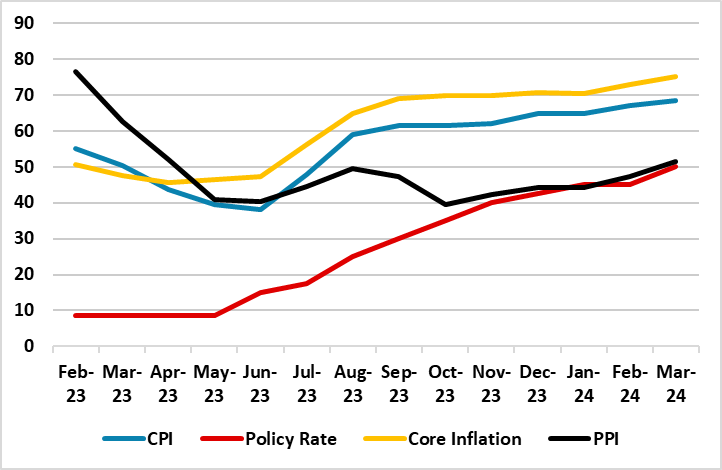Turkiye’s March Inflation Ticks Up to 68.5% Despite Continued Tightening
Bottom Line: Turkish Statistical Institute (TUIK) announced on April 3 that Turkish CPI surged to 68.5% annually and 3.2% monthly in March, and annual inflation swung to a 16-month high due to increases in food and education prices, coupled with the lingering impacts of the minimum wage hike on the services sector. We feel upside risks remain strong which would likely continue drive the inflation in 1H of 2024. We foresee favourable base effects, additional macro prudential measures and tightened monetary and fiscal policies will likely start relieving the pressure on the inflation from mid-year.
Figure 1: CPI, PPI, Core Inflation (YoY, % Change) and Policy Rate (%), February 2023 – March 2024

Source: Continuum Economics
When annual rate of changes (%) in the CPI’s main groups are examined in March, we see that clothing and footwear with 50.1% was the main group with the lowest annual increase while education recorded the highest annual increase with 104%. It is worth mentioning that hotels and restaurants (95%), health (80.3%), and transportation (79.9%) also recorded significant YoY increases.
Core inflation (CPI-C) recorded a strong 3.5% MoM increase, scaling up to 75.2% on an annual basis, which marked the highest on record, particularly due to impacts of the wage hikes and inertia in services and adjustment in administered prices. One good news about the inflation trend was the early signs of easing in the monthly inflation rate as MoM inflation fell from 4.53% in February to 3.2% in March.
Despite galloping inflation, Turkish policy makers remained positive in curbing inflation soon. Short after the release, Treasury and Finance Minister Mehmet Simsek indicated that “Fiscal policy would also be tightened with control over government spending, excluding costs related to last year’s deadly earthquakes. This, together with monetary policy tightening, will together anchor inflation expectations and contribute to the disinflation process.” Central Bank of Republic of Turkiye (CBRT) governor Karahan underscored on April 2 that “We anticipate that our steps toward disinflation will be reflected in financial conditions, demand and pricing behaviours soon.”
Despite mentioned statements, we are of the view that there are strong signs that inflation will continue to stay high in the first half of 2024, as partly proved by the March data. Despite aggressive monetary tightening, lagged impacts of the tightening cycle are still feeding through and we still see upside risks to the inflation outlook. We think recent hikes in salaries, high domestic demand, deterioration in pricing behaviour, weakening currency, strong inflation expectations and surges in public spending during the local elections continue to ignite general level of prices. (Note: Turkish Lira (TRY) was the worst performer across emerging markets in March, weakening 3.5% against the U.S. dollar).
As the recent inflation readings continue to put pressure on the CBRT, the Bank decided to restart tightening cycle in March and lifted the key rate to 50% on March 21 citing significant and persistent deterioration in inflation outlook. We think CBRT would have to closely watch the upcoming inflation figures in Q2 before favourable base effects, additional macro prudential measures and tightened monetary and fiscal policies will likely start relieving the pressure on the inflation from mid-year.